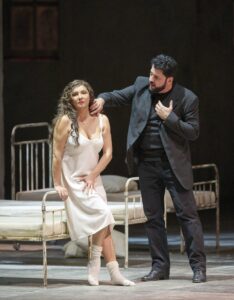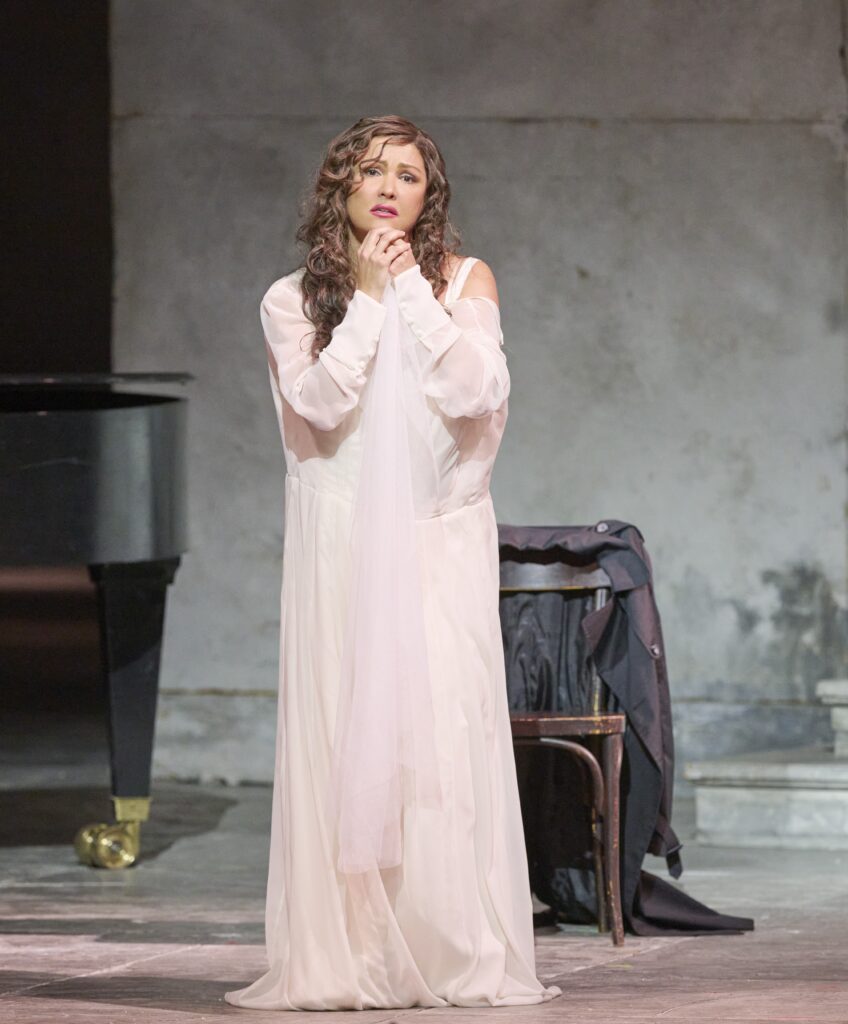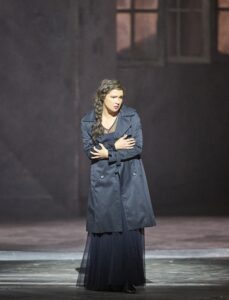‘Yes, as usual, glued to the gaming table, drunk with wine.’ Hermann (tenor Yusif Eyvasov) looks like a devil from hell, brooding, as Tomsky (Alexey Markov) describes him. ‘ Nothing, all night at the tables’, he replies. Tomsky, ‘You were always reserved, but at least cheerful.’ Eyvasov looks swarthy, jet-black hair, bearded, in a black suit. He doesn’t know her name: no name for such beauty. Eyvasov’s is an expressive tenor, tormented, his is not a soft tenor, but pleading, harsh.’ I don’t know her name; don’t care about knowing it.’
Tomsky explains, she is of noble birth, so he can’t possess her.- Eyvasov, ‘You don’t understand! I am sick, I am in love!’ he insists. The Chorus, in the manic mood changes, sing cheerily, God has given us a sunny day! (Background, on stage, a chandelier, cleaned by an army of cleaners.) ‘Are you sure she hasn’t seen you?’ Tomsky aside, sings, ‘the only path for him will be death.’
Prince Yeletsky (richly sonorous bass Boris Pinkhasovich) announces an angel is to marry him. Mellowed, Yeletsky sings, ‘Everywhere, happiness. For I am in love.’ He introduces his fiancée, Lisa (Anna Netrebko.) Hermann has realized who she is. She’s accompanied by her grandmother, the elderly Countess, known as ‘Queen of Spades’. She’s fascinated by his appearance, and simultaneously repelled. ‘Here he is again, the mysterious, brooding stranger. Who is he? -What does he want of me?’ sing Lisa and the Countess, as if in one voice. (Again, Chorus sing of the beauty of the day.)
Tomsky tells the story of the Countess, ‘Many years ago in Paris, a great beauty who pretends she cannot love, preferred faro to love. She lost her entire fortune, but- for the price of a night of love- a Count revealed the secret of three infallible cards; entrusted only to husband, lover, but she’s forewarned by a ghost, ‘smitten by a third’.
Before the wedding, in a scene of wistful melancholy, Lisa sings of sad romance. She’s countered by Pauline, mezzo Elena Maximova, ‘the night is warm and beautiful.’ (Girls dance until rebuked by their governess.) In Lisa’s aria, Netrebko sings of her irresistible, repressed feelings for Hermann. ‘Today I promised my life to a Prince (Yeletsky). Is there anyone as genteel? Yet she’s filled with melancholy and fear. Netrebko, in a white silk gown, radiant, ‘Oh! her girlhood dreams have smiled on her’. Netrebko, supreme in Tchaikovsky’s aria monologues, reminds of the younger Tatyana (in Vienna’s 2013 Eugene Onegin .)
 Hermann suddenly appears, threatening suicide. ‘One moment! A dying man idolizes you.’ Then, in monologue, Can I live one more day when she is with another?’ The Countess, Lisa’s grandmother, arrives. Commands, Go to bed instantly! Eyvasov has to hide. She leaves behind a deathly chill. But alone again, Lisa takes pity, Foolish man, what do you want of me?’ – ‘You are harrowing me to death. (No, life!)’ Eyvasov bursts out, ‘My beauty I adore you!’ And she reciprocates, ‘I AM YOURS! ‘I love you beyond measure.’Eyvasov, sometimes overshadowed by his more glamorous wife, surpasses himself. They embrace passionately, uninhibitedly, real life husband and wife. Meanwhile we audience- sweltering in Vienna’s 30c- are granted, after two hours, an intermission.
Hermann suddenly appears, threatening suicide. ‘One moment! A dying man idolizes you.’ Then, in monologue, Can I live one more day when she is with another?’ The Countess, Lisa’s grandmother, arrives. Commands, Go to bed instantly! Eyvasov has to hide. She leaves behind a deathly chill. But alone again, Lisa takes pity, Foolish man, what do you want of me?’ – ‘You are harrowing me to death. (No, life!)’ Eyvasov bursts out, ‘My beauty I adore you!’ And she reciprocates, ‘I AM YOURS! ‘I love you beyond measure.’Eyvasov, sometimes overshadowed by his more glamorous wife, surpasses himself. They embrace passionately, uninhibitedly, real life husband and wife. Meanwhile we audience- sweltering in Vienna’s 30c- are granted, after two hours, an intermission.
Act 2, which begins with a frivolous fashion show, as part of Lisa’s engagement celebrations. However, Pushkin intended a satire on crass materialism. ‘Everything precious, self-effacing, that raises up mankind, is suppressed by a bitter selfishness, and pursuit of wealth.’
The Act is reprieved by Yeletsky’s aria, an outstanding rendition by Boris Pinkhasovich. In this star aria, ‘you look troubled, but – a moment…he must tell her’, he exclaims, ‘I want to be yours, and yours only.’ It is not I but Fate that has decided.’ Here comes our little mother- hail Katherine!-.- She’s walking down the aisle through the audience.
Hermann’s encounter with the Countess (Elena Zaremba) is a great operatic moment. She’s all in black except for a bejeweled, glittering handbag. She sniffs a green scarf, as if she’s in a Proustian fantasy- recalling Les Évenements’ -events. Opening her compact, she studies the present reality, with Hermann standing in the shadows. (She can see him, the mirror flashes.)
He’s still holding his handgun. She purses her lips playfully. She laughs in his face, and gracefully welcomes the inevitable. Then on his knees, he’s begging for the solution, the card trick… In his black t-shirt- on a camp bed- Eyvasov’s Hermann starts to ravish her! Holding her legs apart. Somewhat profane. Hers, a look of resignation. She’s dead!
To Tchaikovsky’s music – surging strings, a thunderclap- her ghost appears to him, telling him he must marry Lisa, and revealing the three cards. Her ultimatum, he must come to her before midnight, or be considered a murderer. She realizes he’s obsessed, and doubts his love.
The last scene, Act 3, is to say the least confusing. Eyvasov carries a letter. The Countess lies in state, to Tchaikovsky’s Russian liturgical music, with a trumpet reveille.. A mournful, black-dressed Netrebko, of a succession of mourners, pays her respects, as her granddaughter, .. Eyvasov looks increasingly villainous with his document, which he tears up. Too late! he lies on the marble-tiled floor of the mausoleum. Magnificent choral sounds- Vienna State Opera Chorus- in the background.
Grand guignol, Tchaikovsky’s flutes, thunder and lightning flashing through the gothic windows. She, Zaremba’s Countess, is actually sitting up! Glowing, radiant.
As she pieces together the secret of the cards, torn up by Hermann, he takes her in his arms. In their duet, he picks up her handbag stuffed with notes. Green. He laughs in triumph, Eyvasov on impressive form.
The last scene, in Nemirova’s Vienna production, is of the casino with fruit machines. Floozy attendants wait solicitously on the all-male players. The punters in crisp, black suits. One strokes a croupier’s leg with his black, jewel-lacquered cane. These singers, many Russian, are in a class of their own. Authentic.
It’s progressing to an indictment of the Russian gaming business; implicitly patriarchal machismo, Russian oligarchy. But it sounds magnificent, if triumphalist.
And in walks Hermann, flashing his (playing) card. Threatening, wearing a chalk-stripe gangster suit, Eyvasov again surpasses himself; surprises the gamblers, in his will to participate. He bets a huge amount, and wins with his three cards. Then doubles his win. Until Yeletzky speaks out, and cleans up, to avenge losing Lisa.
Vienna State Opera’s modern ‘Queen of Spades’ is fabulously staged. A feast of bling, a gross Russian mafia fantasy, rather divorced from Tchaikovsky’s humanist concept, inspired by Pushkin. But it sounds idiomatic, with Vienna State Opera Orchestra and Choruses under Timur Zangiev. PR. 21.06.2025
Photos: Anna Netrebko (Lisa), Yusif Eyvasov (Hermann); Boris Pinkhasovich (Yeletzky); Yusif Eyvasov, Anna Netrebko; Elena Zaremba (Countess); Anna Netrebko (Lisa). All Photos © Michael Pöhn/ Wiener Staatsoper


